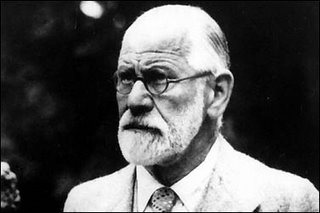 This post is dedicated to Stanley R. Palombo, M.D., one of my former treating psychiatrists.
This post is dedicated to Stanley R. Palombo, M.D., one of my former treating psychiatrists.Every dream, Freud maintained, exhibits "a point of contact with the events of the previous day. Whatever dream I take in hand, my own or someone else's, confirms this experience every time." These "day residues," as he called them, frequently offer the easiest access to the interpretation of a dream. Take Freud's short dream about the botanical monograph, in which he saw before him an illustrated book he had written, with a dried plant specimen bound in each copy; the instigator of that dream had been a monograph on cyclamens he had seen in a bookstore window the morning before. Still, in nearly every instance, the dream ultimately borrows its essential ingredients from the dreamer's childhood days.
Earlier researchers had already noted that infantile material may push its way into the adult's manifest dream; recurrent dreams, first dreamt in childhood and returning years later to haunt the sleeper's nights, are another tribute to the agile acrobatics of human memory. But to Freud only the infantile material that interpretation can uncover, the material concealed in the latent dream thoughts, was truly absorbing. He found it so absorbing in fact that he devoted a whole section to it in his book The Interpretation of Dreams and recounted a number of his own dreams, complete with extensive, exceedingly intimate autobiographical revelations. He was prepared to demonstrate from his private memories that "one finds the child with its impulses living on in the dream."
Contemporary investigators have built on Freud's fundamental theory of dreams, which holds that dreams are concerned with past and present experience, that is, the events of the previous day as well as events from the dreamer's childhood. It seems clear that some kind of scanning or re-programming takes place in dreams which has a beneficial effect upon ordinary mental functioning. Dreaming seems to be biologically adaptive. Stanley R. Palombo, M.D., suggests that dreams are concerned with matching past and present experience. He thinks that
the dream compares the representation of an emotionally significant event of the past with the representation of an emotionally significant aspect of the previous day's experience.
This information-processing function of the dream is concerned with allotting the new experience to the right slot in the permanent memory. Whether this model accounts for all dreams is dubious; but it goes some way to explaining why it is that in dreams, time is so often out of joint. If past and present are compared, it is not surprising that, in the dream, they so often appear to be confused.
No comments:
Post a Comment